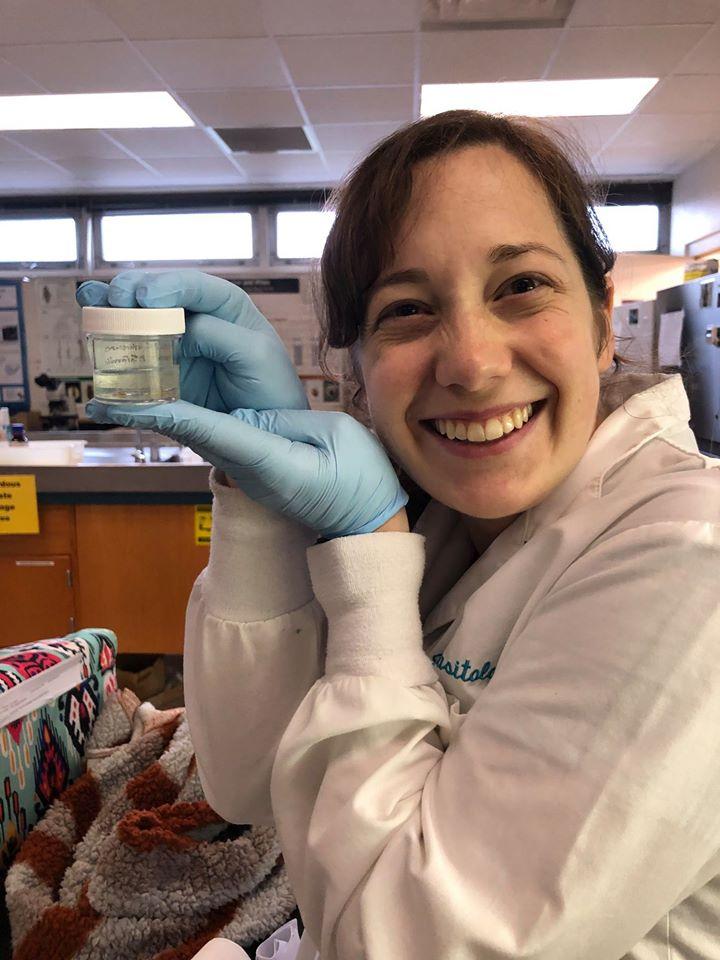Taking it Online...Parasitology Grad Student Successfully Defends Her PhD Virtually to a Worldwide Audience
Years of hard work culminating in a successful PhD defense is a rite of passage for graduate students across the country. Conducting your defense live online to a worldwide audience is a novel approach, and one necessitated by the COVID-19 pandemic.
 Ashley Steuer, DVM, Zoetis Resident in Veterinary Parasitology and now newly minted PhD from the University of Kentucky Gluck Equine Research Center, found herself in this unique position as she defended her doctorate April 14 to a worldwide audience simultaneously via the Zoom and Facebook Live platforms.
Ashley Steuer, DVM, Zoetis Resident in Veterinary Parasitology and now newly minted PhD from the University of Kentucky Gluck Equine Research Center, found herself in this unique position as she defended her doctorate April 14 to a worldwide audience simultaneously via the Zoom and Facebook Live platforms.
Her dissertation, titled, “Host-Parasite Interaction in Horses - Mucosal Responses to Naturally Acquired Cyathostomin Infections and Anthelmintic Treatment,” was viewed live by 150 people who were fairly evenly split between the two platforms and hailed from countries including Germany, Switzerland, Italy, the United Kingdom, Denmark, Finland, Sweden, Netherlands, New Zealand, Australia, Abu Dhabi, South Africa, Colombia, Argentina, Brazil and Canada. The audience included several leading parasitologists from around the world. The recorded dissertation, which is available on the Gluck Center’s Facebook page (https://www.facebook.com/GluckEquineResearchCenter/videos/566563937578152/ ), has since been viewed more than 1,400 times.
“It was a great experience! It uniquely allowed colleagues, friends and others from around the world to tune into the event that they would not have been able to attend in person. This level of support is a very humbling and heartening experience to witness,” Steuer said. “I hope that others also enjoyed the event and were able to learn from it. That is why we are here, to promote and spread quality research concerning the horse. Of course, it is a little nerve-wracking to undergo any defense event, but it wasn’t so intimidating, as, at times, it felt like I was speaking to myself.”
“I particularly enjoyed Ashley’s interaction with her audience”, said her research mentor, Martin Nielsen, DVM, PhD, Dipl. ACVM, Schlaikjer professor of Equine Infectious Disease, associate professor at the Gluck Center. “Several questions were asked during the event. On Zoom, participants used the chat function for asking questions, and Ashley responded to those within the session. Several additional questions were asked on Facebook, where about 50 comments were made, and Ashley responded to all questions posted there after her defense.
“I like how our graduating students can get an opportunity like this to demonstrate their acquired skills as science communicators, and I would like to see us using Facebook live for PhD defense seminars again in the future,” he said.
About Steuer
Steuer earned her Bachelor of Science from Michigan State University in 2012 and her Doctor of Veterinary Medicine from the University of Tennessee in 2016. While in veterinary school, she discovered that her passion was veterinary parasitology.
According to her bio, Steuer followed this passion by pursuing a dual PhD/residency program through the National Center for Veterinary Parasitology, where she became the Zoetis Resident for Veterinary Parasitology at the Gluck Center. Over the last four years, she has participated in many research projects, including the evaluation of the immunologic and inflammatory reactions to anthelmintic treatment in horses; identification of a novel species of parasites in wildlife; testing novel anthelmintic treatments in horses; validation of an automated fecal egg counting method prototypes; a combination deworming study; a parasite prevalence and management practice assessment of rural Kentucky farms; evaluation of common diagnostic techniques; and the development of an in vitro protocol and for maintaining and transcriptome analysis of adult Parascaris spp.
Steuer has published two first author manuscripts and served as co-author on seven published manuscripts. She has also participated in numerous extension events, such as speaking about parasite control to local equine clubs and assisting with developing parasite control programs for local farms.
She has been actively involved in teaching through Lincoln Memorial University College of Veterinary Medicine and the University of Tennessee College of Veterinary Medicine. She also pursued her passion of diagnostic parasitology through the UK Veterinary Diagnostic Laboratory and the UTCVM Veterinary Parasitology Diagnostic Laboratory.
About her dissertation research
According to Steuer’s published abstract, Cyathostomins are ubiquitous parasites in horses. In rare cases, cyathostomins lead to a generalized typhlocolitis (inflammation of the caecum and colon) and death. In healthy horses, local reactions are noted to the mucosal larvae; however, the mechanisms and importance of these reactions has not been explained. It has been hypothesized that anthelmintics can alter these reactions.
Two studies were conducted to clarify the local and systemic immune response following larvicidal treatment. In the first study, ponies with naturally acquired cyathostomin infections were allocated into three groups: fenbendazole-treated (FBZ), moxidectin-treated (MOX) and untreated control.
The second study aimed at evaluating a larvicidal treatment and a non-larvicidal treatment belonging to the same anthelmintic class to classify the local and systemic immune response following larvicidal treatment. Horses with naturally acquired cyathostomin infections were allocated into three groups: Ivermectin (IVM)/praziquantel-treated, MOX/praziquantel-treated and untreated control.
Overall, these studies demonstrated that treatment with an anthelmintic, both larvicidal and non-larvicidal, in healthy horses does not significantly change the proinflammatory or ant-inflammatory response. In fact, it may decrease the local mucosal response in horses, due to the decrease in worm burdens. Cyathostomins induce a proinflammatory response within the host tissue, while the encysted larvae may also induce an anti-inflammatory response as well.
Holly Wiemers, MA, APR is communications and managing director of UK Ag Equine Programs.
